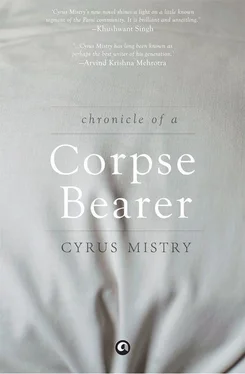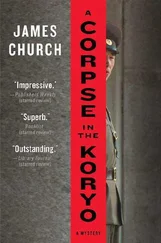As soon as we had climbed up the stairs to the third-floor office which was located in a splendid stone mansion (none of us had had reason to visit it before today), it became evident we were expected. There was an elevator, but the uniformed liftman in charge of it, after a couple of terse questions, seemed to guess who we were, and asked us to take the stairs. Fali was inclined to start an argument with him.
‘Arrey,’ he grumbled aloud, ‘we are here on official work. Who the hell is he to—’ but Farokh put an arm around his shoulder and led him up.
‘It’s only two floors. .’
‘Three, I say, not two! And I’d like to take — I never get a chance to. .’ By then we were already climbing up.
On the landing of the third floor, we were met by a grumpy, middle-aged clerk with an enormous, bald head, whose almost total loss of hair was further underscored by two longish grey tufts protruding from behind each ear.
‘ Chaalo ni, chaalo ni ,’ he urged us as soon as he saw us lumbering up the stairs, pointing at the wall clock in the lobby. ‘You are ten minutes late. Can’t keep them waiting like this, you understand? They’re our guardians, our providers. No, no, no. . now don’t be in such a rush! Just wait a few minutes, please, while I explain all the rules before you enter.’
He told us that he would be showing us through the main office to the trustees’ boardroom, which was a rather grand and important place. But first we must take off our footwear and leave it outside the office.
‘Walk in quietly, please. Don’t fidget, or touch anything along the way.’
We were led through a large room clustered with wooden desks whose tops were fitted with green rexine, and behind which sat the office staff — mostly men — already engaged in examining documents, or typing them. A few visibly indigent Parsis waited in queue for an interview with an officer. As we trooped in silently, barefoot, the office staff couldn’t resist glancing at us, though only for the briefest instant, before averting their eyes.
Not out of diligence or mindful application to their work but rather, as it were, nervous apprehension: as though afraid that even a slightly prolonged gaze might tarnish their spiritual well-being. That fleeting peek they gave us was probably resentment as well, disapproval of their superiors’ wisdom in inviting a bunch of raffish outcasts to their well-appointed workplace. How did they know who we were? Is there something about corpse bearers that makes us identifiably different from average visitors to the Punchayet offices?
The bald clerk, our chaperone, was impatient and rude. However, he showed us in gingerly, not saying much along the way, holding his breath almost, as if fearful of breathing the same air as us, into what was obviously a dark storage room. He switched on a naked electric bulb. Cobwebbed and dusty, cramped with cupboards, shelves, and volumes of obsolescent, mildewed paper, there was a wooden bench in the centre of the small room that had probably been placed there just for us. We were asked to be seated, and wait.
‘Don’t go anywhere,’ he instructed us. ‘Just sit here. No making any noise, please.’
Initially we spoke only in whispers and remained seated, as we had been instructed to. This being our very first visit to the august offices of the Parsi Punchayet, we were a little overawed. But we had a long wait, and gradually, we were back to our normal selves. After a while Rustom stood up and started pacing. He muttered loudly:
‘Saala, they ask us to be here at ten sharp: it’s a quarter to eleven already. I’m feeling so damn hungry. Left without breakfast, just to be on time.’
‘Forget it, Rustom,’ ribbed Fali. ‘You have no rights, certainly no right to feel hungry. You’re suspended, remember?’
‘Breakfast?’ added Farokh, not to be left out. ‘But that’s what you’re here for! Breakfast with the trustees.’
After a while, he said, ‘Oh, don’t look so sad, Rusi. In fact, it’s quite possible, isn’t it? Since we’re suspended, maybe none of us actually exists? How could you possibly be hungry if you’re not there? Think of that. .pinch him, Bomi, pinch and see if he squeals.’
‘Oh, I get you. .’ said Rustom, quickly catching the bug of waggish frivolity. ‘But if that’s the way it is, they may as well string us up at the end of a rope,’ he grinned, wickedly. ‘Then we’d really be suspended.’
But Fali was not about to let him score that point; immediately, he exclaimed with mock vehemence:
‘Oh come off it, Russ-ba, don’t try to play the martyr. Speak the truth and shame the Devil for once. Tell us: aren’t you suspended often enough as it is?’
This time, Rustom didn’t get it: he was taken aback.
‘What nonsense! What do you mean by saying such a thing? In twenty-five years, never once have I—’
‘Every evening, in fact, if you’re honest,’ Fali continued with a straight face. ‘Once you’ve downed your quota of navtaank, don’t you feel afloat? Suspended in mid-air?’
‘Now look who’s splitting hairs!’ said Bomi. ‘Charred kettle covets the burnt pot?!’
Our frivolous banter and guffaws soon drew forth a uniformed peon from the inner chamber, holding a stern index finger to his lips: our merriment, restrained as it was, had evidently been seeping through the boardroom’s closed doors.
‘ Arrey, pankha to lagaao, dikra ,’ Rusi said to him, wiping his forehead with a grubby handkerchief. ‘It’s hot in here. And if we have to wait much longer, how about some chai, or something?’
But in the next instant, before the nonplussed peon could decide how to respond to this aside, one of the double doors of the boardroom swung open, and a curiously chastened figure slunk out whom we almost didn’t recognize: Buchia. In freshly laundered white trousers and bush shirt, he smirked at us, first sheepishly; then the half-smile actually widened to a beam. For a moment we stared back, thunderstruck, as though we had encountered a spectre in broad daylight.
‘Ah, so you are all here?’ he said, voice syrupy with bonhomie. ‘Good, good. Don’t worry, boys. Nothing’s going to happen to you. They’ll call you in very soon. Just try to be polite. Unfortunately, I have to rush. To the Sessions Court, where that matter of the encroachment is supposed to come up.’
So saying, he strutted away with a friendly wave.
‘ Don’t worry. .? Nothing’s g oing to happen. .? Behnchoad ,’ swore Fali under his breath. ‘All this sly manoeuvring, it’s all his —take my word for it. Suspension orders, everything — it’s all at his prompting: Buchia at his manipulative best.’
‘What encroachment matter was he talking about?’ asked Rusi.
‘On the Babulnath side,’ replied Boman. ‘On that new plot of land donated by the Dadachandjis—’
‘Where—?’ asked Farokh blankly.
‘Arrey, exactly touching the Albless Bungli, on the west side: some fellows have put up bamboos and a tent. A couple has even moved in with a trunk.’
Just then, the peon came out again, holding a slip of paper from which he read out our names. Not all of them, only four actually. One by one, my mates stood up, as their names were called out, and prepared to walk in. I was the only one left sitting. Assuming some oversight on the peon’s part, I too started up, and made to follow the others. But I was stopped.
‘No, no, you must wait. Only those whose names were called.’
What the hell? I thought, sitting down again as the others shuffled into the inner chamber.
They were not inside for long. Four or five minutes later, when they emerged from the boardroom, relief was writ large on their faces. Bomi, Fali and Farokh were all smiles.
Читать дальше












